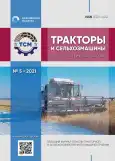Оценка смещения угловой шкалы для повышения точности управления одноцилиндровым двигателем
- Авторы: Абрамов П.В.1
-
Учреждения:
- ОП ООО «НПП «ИТЭЛМА»
- Выпуск: Том 88, № 5 (2021)
- Страницы: 55-64
- Раздел: Качество, надёжность
- URL: https://bakhtiniada.ru/0321-4443/article/view/105671
- DOI: https://doi.org/10.31992/0321-4443-2021-5-55-64
- ID: 105671
Цитировать
Полный текст
Аннотация
Существенного снижения затрат на управление одноцилиндровым двигателем с принудительным воспламенением для средств малой механизации можно добиться путем замены материальных датчиков виртуальными. Необходимая для управления информация может быть извлечена из частоты вращения коленчатого вала. Достоверность оценки состава смеси по внутрицикловой вариации угловой скорости коленчатого вала зависит от множества факторов, в том числе и от точности установки датчика положения данного вала и диска синхронизации либо другого элемента для определения углового положения коленчатого вала в выбранной системе отсчета.
Выявлены свойства одноцилиндрового двигателя, позволяющие значительно ослабить влияние смещения угловой шкалы на точность оценки состава смеси по кинематическим параметрам работы двигателя, а также произвести оценку самого смещения.
Эксперименты проведены на двигателе общего назначения Honda iGX440 с рабочим объемом 0,44 л, оснащенном опытной электронной системой управления впрыскиванием топлива, зажиганием и дросселированием. Нагрузкой служил гидротормоз.
Смещение угловой шкалы может быть определено различными способами: по отклонению фазы гармоники кинетической энергии кривошипно-шатунного механизма любого наблюдаемого порядка в экстремуме зависимости данной фазы от угла опережения зажигания при прочих равных условиях; по сдвигу производной по углу опережения зажигания указанной зависимости; по сдвигу зависимости разности данной фазы и угла опережения зажигания от последнего; по отклонению фазы гармоник кинетической энергии кривошипно-шатунного механизма высших порядков при угле опережения зажигания, нивелирующем действие смещения шкалы на фазу основной гармоники кинетической энергии кривошипно-шатунного механизма.
Уточнение положения коленчатого вала за счет оценки смещения шкалы предложенными способами позволит сохранить необходимую точность управления углом опережения зажигания на одноцилиндровых двигателях при увеличении допуска на установку элементов для определения углового положения коленчатого вала.
Полный текст
Открыть статью на сайте журналаОб авторах
П. В. Абрамов
ОП ООО «НПП «ИТЭЛМА»
Автор, ответственный за переписку.
Email: abhpv@yandex.ru
к.т.н.
Россия, ВладимирСписок литературы
- Ravenhill P., et al. Low cost electronic fuel injection for motorcycles and utility engines // SAE Paper 2009-32-0149.
- Service manual. EX13, 17, 21, 27, SP170, SP210, EX21 electronic fuel injection engines. Robin America, Inc., 2009. URL: https://www.subarupower.com/media/manuals/129036362809063750.pdf (дата обращения: 14.08.2021).
- Takano Y., et al. Development of intake air pressure sensorless fuel injection system for small motorcycles // SAE Paper 2011-32-0564.
- Nishida K., et al. Estimation of indicated mean effective pressure using crankshaft angular velocity variation // SAE Paper 2011-32-0510.
- Seuling S., et al. Model based engine speed evaluation for single-cylinder engine control // SAE Paper 2012-32-0044.
- Абрамов П.В., Свирин О.А., Сухов С.П., Кочетков А.А. Оценка наполнения и состава смеси в одноцилиндровом двигателе с принудительным воспламенением по внутрицикловой вариации угловой скорости коленчатого вала // Фундаментальные проблемы совершенствования поршневых двигателей: материалы XII Междунар. науч.-практ. конф. Владим. гос. ун-т. Владимир, 2010. С. 79−86.
- Абрамов П.В. Фазовый регулятор состава смеси для одноцилиндрового двигателя // Двигателестроение. 2021. № 2. С. 26−30.
Дополнительные файлы













